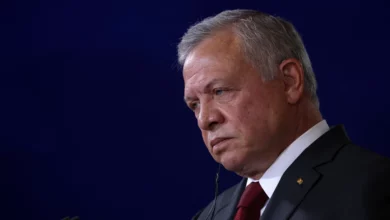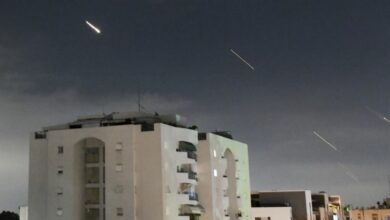The recent poem of Gunter Grass, “What Must Be Said,” has stirred a storm of controversy in the West, as he meant it to do. The poem is, in a sense, an opinion piece in poetry form, which is part of its surprise in a world of prose. Without a doubt, the vehemence of reaction to the poem in Israel and among its backers is prompted more by Grass’ status as an eminent author and public intellectual. Grass took bold political stands before, especially in opposition to the reunification of the two German states, when he argued against the mainstream that the wealth and sense of superiority of West Germans would marginalize the East Germans.
Although poetry has always engaged the political, the political — at least in the West — seldom scrutinizes the poetic. Thanks to Israel and its allies, this is the second poem in recent memory to be catapulted into political prominence. The first was a poem (how many remember it now?) by the late Palestinian Mahmoud Darwish in 1988, “Those Passing Through Fleeting Words,” which he penned as the Israeli military attempted to crush the first Palestinian uprising and deported its leaders.
The charge against Darwish was that he had called for the expulsion of the Jews from Palestine. Then Israeli poet Haim Guri made a typical comment about the dire implications of the poem, “The future looks bleak and dangerous … Darwish's poem only lends substance to this.” Two dozen years later, and with ever-expanding Jewish settlements in the West Bank and a suffocating wall system that further fragments Palestinian communities and isolates them from one another, we may ask: Whose life is bleak in Palestine, the life of the Arabs or of the Jews?
In a poem Darwish composed during the Israeli siege of Palestinian cities and towns in 2002, he said, “Writing is a puppy scratching the void/it wounds without blood.” Yet Grass’ poem is attacked today as if it was a policy undertaking by a major world power that will stop Israel from doing what it plans to do to protect itself from being destroyed by Iran.
“What Must Be Said” is a “tactical” or occasional poem, as opposed to a “strategic” work, like, say, T.S. Eliot’s celebrated “The Waste Land,” evoking the decline of the West. Its basic thrust is that Israel, which possesses an atomic arsenal, refuses to grant the United Nations permission to inspect its nuclear facilities, and that Germany and the West in general have been hypocritical by censoring only Iran, which might be planning to acquire the dreaded bomb.
The poem expresses the fear that a massive attack on Iran could leave many dead, and that Germany would be heavily implicated in abetting such a crime through its extensive financial and military aid to Israel under the rubric of “reparations.” Perhaps the poem contains exaggeration about Israel annihilating Iran. In this regard, a similar poem by Grass would have been even more apt in the summer of 2006 or winter of 2008, while Israel wreaked death and destruction on Lebanon or on Gaza. Nonetheless, the current poem is meant to break the silence about placing Israel beyond criticism in West Germany: “Why though have I stayed silent until now?/ Because I thought my origin,/ Afflicted by a stain never to be expunged/ Kept the state of Israel,” the poet interrogates himself and explains.
In Germany, criticism of Israel has been taboo long before Iran’s nuclear issue, never mind that Germany assists Israel massively in the relentless erasure of the existence of the Palestinian people. One would think that a repentant Germany would try to expiate its sins by helping its former victims in constructive pursuits, not in a project of liquidating another people. The poem hence pours forth like a catharsis, a return of the repressed from long, German self-enforced silence concerning Israel’s destructive conduct in the region.
Israel and its defenders in their campaign against Gunter Grass have skirted the core issue raised by the poem — Israel’s possession of nuclear weapons — and tried to discredit him by labeling him an “anti-Semite.” Such labeling has been consistently deployed to intimidate an impressive array of prominent critics of Israel, including former US President Jimmy Carter after he published his book, “Palestine: Peace, Not Apartheid”; two American international relations scholars, John Mearsheimer and Stephen Walt, for their extensive documentation of the extraordinary influence of the Israel lobby on Washington’s Middle East policy; and the late Portuguese novelist and Nobel Prize winner Jose Saramago for his outspoken sympathy with Palestinians.
In spite of the many gestures Grass makes in the poem toward Israel by striking a balance between Israel and Iran, through invoking German guilt, and by affirming that he is “bound” to that state, he feels the need to pre-empt the Zionist customary rebuke, “the punishment is promised/ As soon as it is ignored;/ The verdict of 'anti-Semitism' is familiar.”
Grass does not let himself be intimidated by the stigma. He asserts that Israel and the West’s focus on Iran’s potential building of a nuclear bomb while Israel itself has an undisclosed number of these weapons of mass destruction is hypocritical — to which we might add, it is also highly misleading. Israel understands that Iran would never attack it with an atomic weapon, if it ever comes to possess it, unless Iran itself is willing to risk being flattened by NATO the day after. If Iran harbors ambitions to become a nuclear power, the motivations behind the quest would range from nationalism, regime maintenance, to achieving dominance in the Gulf region, none of which has anything to do with Israel. However, Israel finds the alleged Iranian nuclear weapons plans a convenient smoke screen to complete its takeover of Palestine, to say that the principal issue in the Middle East is not Israel, but Iran, to try and establish alliances with Arab Gulf states, and to garner more aid from America and Europe.
So, what must be underlined: Why does not the UN inspect Israeli nuclear facilities? Why does Israel object to a policy of nuclear-free Middle East as is advocated by Egypt and other Arab countries? Why does the US once more let itself be wagged by Israel?
Grass’ poem explicitly and provocatively directs attention to those questions. Let’s hope, together with the poet, that his own speaking will “free many from silence.”
Sharif S. Elmusa is a Palestinian poet and a professor of political science at the American University in Cairo.




